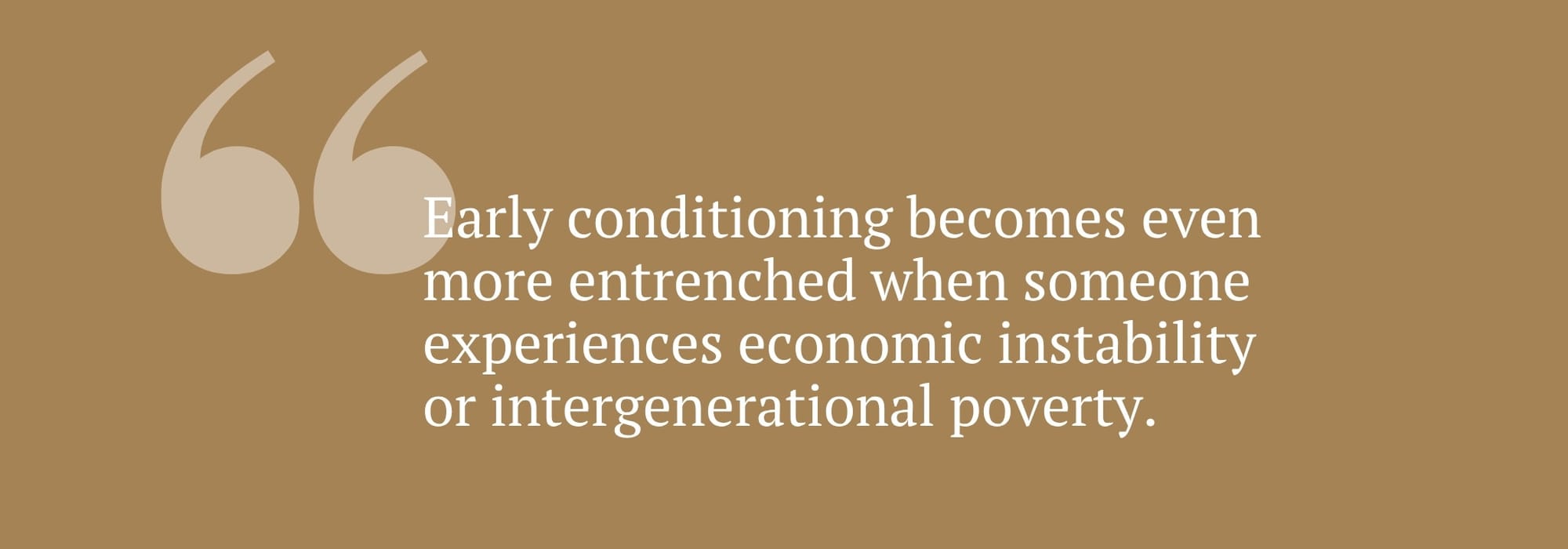In a world that convinces you that wealth equals worth, we’re helping you take back control of your money story…
Have you ever contemplated your emotional connection to cash? Perhaps it’s the shame of being constantly in your overdraft, or the way you hoard money when you know you have enough to spare. Maybe you find yourself offering to buy a round of drinks because you feel you ‘should’, or spending money quickly because you worry it will somehow disappear. If this sounds familiar, you may be experiencing money dysmorphia.
What is money dysmorphia?
Everyone gets anxious about money from time to time. But people with money dysmorphia have a distorted self-perception which is linked to financial worth, as opposed to their true circumstances. Someone with money dysmorphia might have significant wealth, but still feel ‘less than’ because of how they view themselves. Similarly, someone with limited financial resources might feel they are ‘failing’ when realistically, they are financially safe, but are constantly comparing themselves to strangers on the internet.
Capitalism thrives on profit, and with the current cost of living crisis, alongside convincing marketing tools that prey on our perceived shortcomings, it’s no wonder that a study by Credit Karma has found that 43% of millennials and gen Z-ers suffer from money dysmorphia. More than half (54%) of respondents who experience money dysmorphia say they’re ‘obsessed with the idea of being rich’, compared with just 12% of those who do not struggle with the condition.
The root of money dysmorphia is complex, with counsellor Tina Chummun explaining that our relationship with money is influenced by numerous factors, including “external environments, mental health, neurobiology, patriarchy, trauma, social media, and historical norms”.
“It often forms at the messy intersection between early attachment patterns, financial trauma, and the ever-present pressure cooker of socio-economic comparison. From a neurobiological perspective, our brains are wired to seek safety and status,” Tina says. “The amygdala and prefrontal cortex, both involved in threat detection and decision-making, are highly responsive to social cues and perceived scarcity.”
For example, growing up you may have felt that approval of others was linked to your performance. Alternatively, you may have watched a parent struggle to put food on the table, resulting in financial trauma from a young age. According to Tina, the developing brain then begins to equate being worthy with having more.

“This early conditioning becomes even more entrenched when someone experiences economic instability or intergenerational poverty,” says Tina, who points out that stereotypical gender roles can also play a part in how we relate to money. This complicated set of forces can impact the nervous system, and become internalised as shame. “This is where money dysmorphia takes root: when someone constantly feels left behind and stuck, regardless of their actual circumstances.”
How to spot the signs
Money dysmorphia manifests uniquely in each individual, but it is always linked to a distorted perception of feeling ‘not enough’. It might look like overworking and still feeling behind, worrying about money when there is no immediate danger, ignoring bank statements, being too fearful to check your bank balance, or feeling a deep sense of inadequacy despite being financially stable.
The fight/flight/freeze cycle may manifest as obsessive budgeting, followed by an all-out spending spree. It can affect decision-making, to the point where you may self-sabotage by offering to pay for others when you can’t afford to. You might also feel a sense of shame when you buy something pleasurable, even if you can afford it, due to internalised beliefs about your worthiness.
Resetting the balance
Tina suggests using journaling as a way to note down any feelings or patterns of behaviour you observe in your daily life, as a way to recognise and accept your experience of money dysmorphia.
“Track your emotions, not just your spending. By keeping a journal where you note your mood when you earn, spend, or avoid money, you’ll start seeing emotional patterns, rather than just financial ones. This will help you manage your finances through understanding what you are spending your money on, together with how you are feeling.”
As you work towards increasing awareness of your thoughts and feelings, you should also explore somatic awareness. This means checking in with your body to see how financial matters impact you. Do you get a tight jaw right before payday? A rapid heartbeat when you check your bank balance? A queasy stomach? According to Tina, these aren’t just money nerves – they’re unresolved threat responses, and once you’re aware of them, you can begin to unravel them and make positive changes.
Try mentally reflecting on your beliefs around money. Tina says: “Ask yourself, whose voice is this? When you feel guilty spending or ashamed of your bank balance, are you hearing your voice, or your parents’? Are the voices related to your cultural background? From your teacher? From your friends or social circle? By naming whose voice it is you may be hearing the most, you can work towards reclaiming your own voice in relation to the money you have, want, or need.”
Try to be mindful of the content you read online, and consider unfollowing or muting social media accounts that make you feel like you’re not enough. “Instead, follow financial educators who speak about equity, trauma-informed budgeting, and rest instead of hustle,” suggests Tina.
Remember that building this self-awareness is a difficult task, as it may be linked to unresolved trauma. In which case, you may benefit from support from a trained therapist. Tina explains: “Through nervous system regulation, exploring coping mechanisms, and self-soothing strategies, together with somatic tracking, therapy can help to ease the physiological grip of money trauma.”
Tina also notes the importance of exploring the influence of culture, class, and gender on our internal beliefs around money. Finding a therapist who you trust with these aspects of your experience can create a safe space for you to unpack inherited money scripts tied to systemic inequality.
While financial therapy may offer ways to help manage your money, it’s important to note that this is not the same as speaking to a financial advisor. Whether you speak to a therapist or go it alone, making a plan of action can help you regain control of your finances and self-image. Depending on your situation, this might involve creating a budget, tracking spending habits, setting up a savings account, or finding a path to becoming debt-free. Check out moneyhelper.org.uk for online tools and calculators, as well as advice on everything from credit scores to claiming benefits.
Above all, Tina emphasises: “Money dysmorphia is not a personal failing, it’s a symptom of cultural disconnection.” In a world that wants to glamourise the hustle and keep you on a hamster wheel of seeking validation through financial means, know that your worthiness is not determined by your bank balance, but instead, can be shaped by how much compassion you can offer yourself.


Comments